Unit 12 翻译中视角的转移
Unit 12 翻译中视角的转移
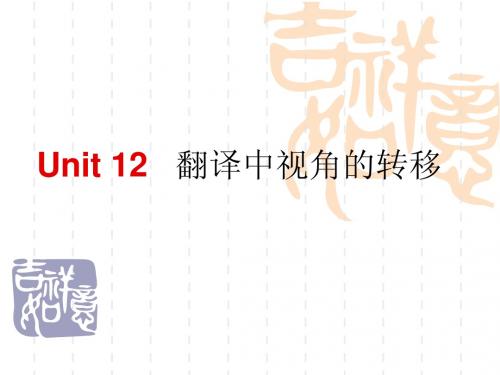
否定句式汉译英中的 常见错误及分析 上外网
翻译技巧总结篇!!点击看看?
常用翻译技巧
See you!!
4. 谅你不敢再这么干。 Do that again if you dare. 5.你借钱给那个无赖,不啻把钱丢海里。 You might as well throw your money into the sea as lend it to that rascal. 6. 自然界中的作用力,必定要牵涉到两 个或两个以上的物体。 There is never a force acting in nature unless two or more bodies are involved.
4. 欲速则不达。 More haste, less speed. Haste makes waste. Haste brings no success.
副词或副词短语: little, otherwise, too…to.. etc. 1. 显然他有不同的想法。 He evidently thinks otherwise. 2. 他兴奋得说不出话来了。 He was too excited to speak.
Warm-up practice: 1. 今天的中东还很不安宁。 The Middle East today is far from peace. (反说正译) 2. 他的解释不能让人满意。 His explanation is far from satisfactory. (反说正译) 试比较:His explanation is really not satisfactory.
3. 他未能旅行诺言,我们大家都很 失望。 His failure to carry out his promise has disappointed every one of us.
现代大学英语精读3(第二版)Unit12课文翻译及课文知识重点
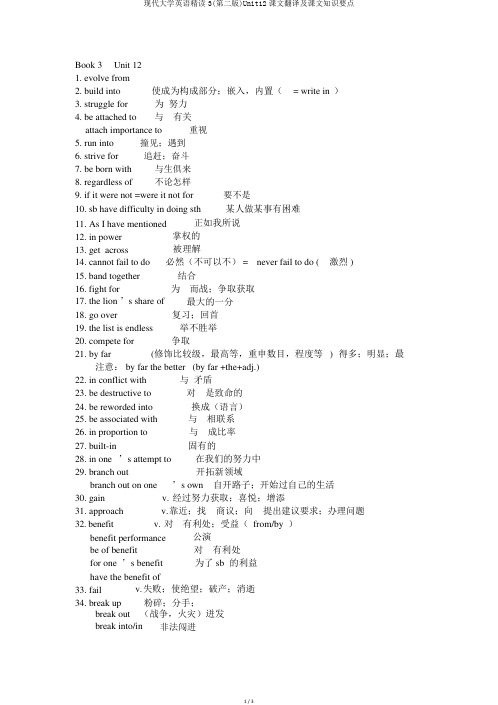
Book 3Unit 121. evolve from2. build into使成为构成部分;嵌入,内置(= write in)3. struggle for为 努力4. be attached to 与 有关attach importance to重视5. run into撞见;遇到6. strive for追赶;奋斗7. be born with与生俱来8. regardless of不论怎样9. if it were not =were it not for要不是10. sb have difficulty in doing sth 某人做某事有困难11. As I have mentioned 正如我所说12. in power 掌权的13. get across 被理解14. cannot fail to do 必然(不可以不) = never fail to do (激烈 )15. band together 结合16. fight for 为 而战;争取获取17. the lion’s share of 最大的一分18. go over 复习;回首19. the list is endless 举不胜举20. compete for 争取21. by far (修饰比较级,最高等,重申数目,程度等 ) 得多;明显;最注意: by far the better (by far +the+adj.)22. in conflict with 与 矛盾23. be destructive to 对 是致命的24. be reworded into 换成(语言)25. be associated with 与 相联系26. in proportion to 与 成比率27. built-in 固有的28. in one’s attempt to 在我们的努力中29. branch out 开拓新领域branch out on one’s own 自开路子;开始过自己的生活30. gain v. 经过努力获取;喜悦;增添31. approach v.靠近;找商议;向提出建议要求;办理问题32. benefit v. 对 有利处;受益( from/by)benefit performance 公演be of benefit 对 有利处for one’s benefit 为了 sb的利益have the benefit of33. fail v.失败;使绝望;破产;消逝34. break up 粉碎;分手;break out (战争,火灾)迸发break into/in非法闯进break through打破,打破,突围35.for the sake of safety 为了安全起见36.call on 呼吁;接见call out 出动,招集;高声叫唤37.stand on the side of 站在 一边;包庇;帮着stand behind做后盾38.get across 超出,渡过(一端到另一端)get through穿过(内部)slip through(从窄缝中)溜过,轻盈地穿过39. look around(round)环视40. in the hope that怀着 希望41. written on被写在 上42. strike out独立闯新路43.contradictory to 与 相矛盾44.share among=divide among 在 之间分派share with sb与 sb 一同分担Translation1.第二次世界大战此后,好多国家一个一个地博得了独立。
Unit 12 汉英翻译应试技巧
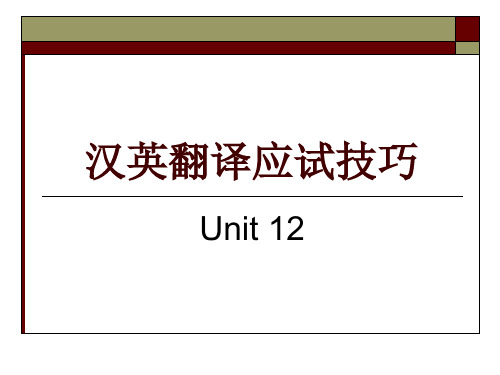
抓住主要信息点进行组句 在汉译英中要抓住主要信息点进行组句,使 译文重点突出。 例: 唐长安城包括今西安市城区和近郊区,面积 相当于现在西安城的七倍半,城周有三十六 点七千米,城内居住着约一百万人口。
例:唐长安城包括今西安市城区和近郊区,面积 相当于现在西安城的七倍半,城周有三十六点七 千米,城内居住着约一百万人口。 During the Tang Dynasty, Chang’an included present-day Xi’an and its suburbs, 6.5 times larger than pre-liberation Xi’an. It was 36.7 km in circumference, and had a population of one million. In Tang Dynasty, its capital city Chang’an, with a circumference of 36.7 km, was 7.5 times as large as Xi’an today, equal to the whole area of present-day Xi’an together with its outskirts, and had a population of about one million.
吃透原文,周密考虑每个词语的确切含义 我们的共产党和共产党领导的八路军,新 四军,是革命的队伍。 Our Communist Party and the Eighth Route and New Fourth Armies led by our Party are troops of the revolution. Troop → battalion
努力传达原文中的各方面信息 ●首先要确定译文的基本时态和基本语域。 例: 他回到离别三年的故乡。 ① He returned to his hometown from which he had been away for 3 years. ② He returned to his hometown which he had been away from for 3 years. ③ He returned to his hometown he had been away from for 3 years.
chapter 12英语翻译方法6PPT教学课件
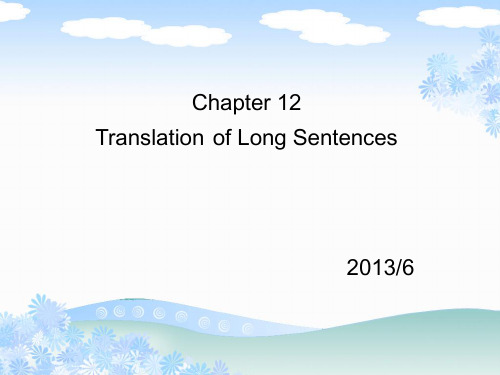
• 我国目前正在修订专利法和商标法,拟议要修订的许多内 容都要进一步向国际标准和国际化靠拢;有的即使准备分 两步甚至三步走,那也是为了做好协调工作,稳妥前进, 避免欲速则不达。
• China is at present revising its Patent Law and Trademark Law, and many of the contents recommended for revision are coming closer to international standards and internationalization; in respect of some other contents, although preparations are being made to revise them in two or even three steps, it is only for the sake of accomplishing the task of harmonization properly, ensuring steady progress and avoiding the hazard of “more haste, lessginal Order
• From the standpoint of the developing countries, the next decade should see a greatly accelerated program for scientific and technological cooperation, aimed at widespread dissemination of technology for meeting the basic needs of man, such as nutrition, shelter, communications, health and sanitation.
英汉翻译中的视角转移

“Stay in”可以翻译成“不出门”;“out of sight”可以翻译成 “眼不见”;“keep the rain out”可以翻译成“别让雨进来 了”。
3. 时间视角的转移 时间有先后之分,同一件事发生的时机可以从前往后 看,也可以从后往前看,这是时间视角转移的基础。
分析 在翻译时由于中英两种语言和民族思维方式不同,我们经常按 照译语的思维方式或表达习惯重新组织原句的信息,从与原语不同的 角度来表达同样意思。 例子中采用了人称视角,原译的视角没有变化,而试译则将all the people换成了“此地”,这便是从人称视角到物称视角的转换。
这里的“人称视角”不是语法上的第一、二、三人称的意思, 而是以“人”为切入点的表述视角;与之相对的“物称视角”则指表 述时以“物”或“事”为着眼点。采用了物化视角的转换,可以与前 一部分“我抵达斯丹尼斯劳时”的地方对应,使句子前后意思更加一 致。
4. 正反视角的转移 在英汉翻译过程中,由于两种语言习惯的不同,经 常需要把英语中的正说译成汉语中的反说,或把英语 中的反说译成汉语中的正说,这样才能确切表达原意 并符合目标语的规范。
从根本来说,是逻辑习惯和语言习惯决定了在翻译中是否应 该采取正反视角转移的方法。
比如这样一句话“He would say no more”, 如果用否定的方法翻译,可以翻译成“他不肯再多说 了”, 如果用肯定的说法,可以翻译成“他只肯说到这里”。
在以下几个例子中,译文的主体都不同于原文的主体,均发生了主体的转移。
(1) I felt that life was passing me by.
译文 我感觉自己在虚度光阴。 (2) Now I do not for a moment mean to disparage business. My whole point is that it was not for me.
英语翻译――视角转换PPT课件

16
• 当人们游览桂林时,那些自然景观和人 文景观,总能令人惊叹并且深思。
• When people travel in Guilin, those scenic and cultural attractions can always impress them and make them think.
11
• 您先请。 • You first. • After you.
12
• 我不是故意的。 • I didn't do it on purpose. • It was an accident.
13
• 人们可以乘飞机、坐火车、走高速 来桂林。
• People can come to Guilin by plane, train and expressway.
• In the dense groves wild monkeys are oftern seen to appear and disappear.
28
结束语
当你尽了自己的最大努力时,失败也是伟大的, 所以不要放弃,坚持就是正确的。
When You Do Your Best, Failure Is Great, So Don'T Give Up, Stick To The End
• The hills and waters come alive with the sound of music during the annual Zhuang Folk Song Festival.
15
• 您可以24小时随时下榻我们酒店。
英汉汉英视译教程上篇英译汉第十二单元 定语句视译
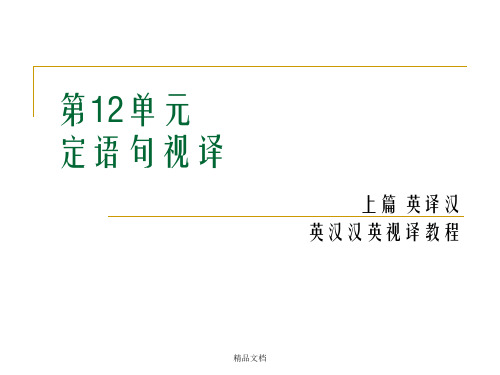
上篇 英译汉 英汉汉英视译教程
精品文档
第12单元 定语句视译
定语句,在此既指包含定语从句的句子,也指包含定语词 语的句子。英语定语词语多为前置修饰,同时也有后置修 饰的。鉴于定语词语较简短,在句子中的位置比较固定, 其视译技巧掌握起来比较容易,在此就不再仔细探究,仅 见实例即可。英语定语从句修饰名词或代词,被修饰的名 词,词组或代词即先行词。定语从句通常出现在先行词之 后,由关系词(关系代词或关系副词)引出。在此详述英 语定语从句结构的目的是因为定语从句在英语里出现频率 很高,且为后置修饰,而汉语里的定语词语或定语从句的 位置多为前置,从而形成英汉之间思维方式的极大反差, 从而给瞬间需要思维方式转换的视译带来巨大困难。
5. Dietrich, already an indefatigable inventor, started toying with the idea of producing a flying car that enthusiasts and businesspeople could take on short trips.
2. One day last February, a Twitter user in California named Billy received a tweet from @ JamesMTitus.
【笔译】 去年二月的一天,加利福尼亚一个名 叫比利的推特用户收到了一条来自
【视译】 @JamesMTitus 的帖子。 去年二月,加州一位推特用户,名叫比 利,收到了一条来自@JamesMTitus 网 站的帖子。
精品文档
第12单元 定语句视译 (要点梳理)
英汉思维方式极大反差 英语定语:定语词语,前置修饰;定语从句,后置
英汉互译的视角转移

英汉互译的视角转移曹旭【摘要】句子主语是构成语言视角的基础性因素,在英汉互译过程中,译者往往需要从对译文主语的准确把握上出发,对复杂的语言材料进行视角处理.主要有4种情形的视角转移处理方式:变换主语的人称或物称;适应不同文化背景下的语义逻辑,搭配好主谓;对上下层级的处理;着眼句群.英汉互译过程中要注意视角的差异及正确处理视角的变化,这样才能使译文地道,使译文具有可读性,真正做到翻译与文化的融合.【期刊名称】《黎明职业大学学报》【年(卷),期】2015(000)001【总页数】4页(P66-69)【关键词】英语;汉语;翻译;视角转移;主语【作者】曹旭【作者单位】黎明职业大学外语外贸与旅游学院,福建泉州362000【正文语种】中文【中图分类】H059视角是叙事学当中最重要的词汇之一,它体现出人物观察事物的角度;角度不同,则事物展现出来的面貌很可能大相径庭。
一个句子以什么样的视角出现,句子的主语是决定因素;主语不同,则视角不同。
英汉互译过程中必须正确把握两种语言在主语设定及其效果的差别,使译文更加符合语言的自然形式,更加贴近中、西方各有的思维习惯、观察事物习惯。
英汉两种语言在句子主语或用人称或用物称的差异,导致英汉语句视角有所差别,这应当是英汉语句视角差异的最基本表现。
这也成为研究英汉语句视角差异须首要了解的问题。
虽然英语句子和汉语句子都大量存在人称做主语的现象,但是,英语句子除了以人称做主语外,还有大量的以物称做主语,即以动物、或物品、或事件作为句子的主语。
相比较而言,汉语更多使用着以人称做主语的句子,此外是大量的无主句——无主句中被省略的主语也多为人称主语。
英语以物称做主语,是由于西方文化历来注重自然科学和逻辑学,更注重客观。
可见,在英汉两种语言间翻译,需要在相应语言环境和文化环境中准确把握语句的主语。
连淑能就英语常以物称做主语这一现象,认为:“非人称表达法仍是英语常见的一种文风,尤其常见于书面语,如公文、新闻、科技论著以及散文、小说等文学作品。
- 1、下载文档前请自行甄别文档内容的完整性,平台不提供额外的编辑、内容补充、找答案等附加服务。
- 2、"仅部分预览"的文档,不可在线预览部分如存在完整性等问题,可反馈申请退款(可完整预览的文档不适用该条件!)。
- 3、如文档侵犯您的权益,请联系客服反馈,我们会尽快为您处理(人工客服工作时间:9:00-18:30)。
Unit 12 翻译中视角的转移
课时:
2H
教学目的要求:
认识并初步理解汉英翻译技巧中的正说反说技巧,并在实践中加以运用。
教学重点:
汉英翻译中的正说技巧,并能够根据提示灵活运用该技巧进行翻译,重点掌握表示正说常用的词汇。
教学难点:
如何使译文准确、地道。
教学内容:
◆Things could be expressed either in a positive way or in a negative way.
◆One of the biggest differences between Chinese and English.
⏹Warm-up practice:
1.今天的中东还很不安宁。
The Middle East today is far from peace. (反说正译)
2.他的解释不能让人满意。
His explanation is far from satisfactory. (反说正译)
试比较:His explanation is really not satisfactory.
3.黄鼠狼给鸡拜年,不安好心。
The weasel pays a courtesy to the hen with evil intent. (反说正译)
试比较:The weasel goes to pay respects to the hen not with the best of intentions.
4.我认为他的回答不对。
I don’t think his answer is correct. (正说反译法)/(反说正译) (注意句子结构
前后的对比)
5.天都这么晚了,我看她不会来啦。
It is so late; I don’t think she will come. (正说反译法)/ (反说正译) (注意前
后结构的对比)
⏹正说法(用英语形式上肯定的词表示中文意义上否定的意思)
表否定语气的动词fail, miss, lack, ignore, refuse, withhold, refrain from, neglect, deny, overlook, exclude etc.
1.他不愿意接受那笔款子。
He refused to take the money.
2.他去机场接朋友,可是在人群中未见到他。
He went to the airport to pick his friend up, but he missed him in the crowd.
3.他看了看桌上的点心,摇了摇头,一点也不吃。
He ran his eyes over the refreshments on the table but shook his head and refused to touch anything.
表否定语气的名词:absence, failure, refusal, ignorance, neglect, exclusion etc.
1. 司机开车时,千万不能心不在焉。
A d river’s absence of mind is absolutely forbidden.
2. 我们完全不知道他的计划。
We are in complete ignorance of his plan.
3. 他未能旅行诺言,我们大家都很失望。
His failure to carry out his promise has disappointed every one of us.
形容词或形容词短语:few, little, free from, far from, safe from, short of etc.
1. 他的作文中几乎没有语法错误。
There are few grammatical mistakes in his composition.
2. 那家伙极不老实。
That fellow is far from being honest.
3. 所谓中国文明者,其实不过是安排给阔人享用的人肉的筵宴。
所谓中
国者,其实不过是安排这人肉的筵宴的厨房。
(鲁迅《灯下漫笔》)
Our vaunted Chinese civilization is only a feast of human flesh prepared for the rich and mighty. And China is only the kitchen where these feasts are prepared.
(杨宪益、戴乃迭译)
4. 欲速则不达。
More haste, less speed.
副词或副词短语:little, otherwise, too…to.. etc.
1. 显然他有不同的想法。
He evidently thinks otherwise.
2. 他兴奋得说不出话来了。
He was too excited to speak.
连词:unless, before, until, (rather)than, or etc.
1.机不可失,时不再来。
A golden opportunity knocks but once. (An opportunity is not likely to repeat to
repeat itself.)
2.他宁愿饿死,也不愿行窃。
He will die of hunger before he steals. He would rather die of hunger / starve than steal.
介词和介词短语:without, above, except, beyond, instead of, in place of, out of etc.
1.这非我能力所及。
This is beyond my reach.
2.要不是你帮忙,我是无法按时完成那任务的。
Without your help, I could not have fulfilled the task in time.
含有半否定语气的词:seldom, hardly, barely, scarcely, rarely
1.工作没有经验,出点差错,在所难免。
Slips are scarcely avoidable when you are new to your work
2.他太自私了,几乎谁也不喜欢他。
Hardly anybody likes him, because he is too self-centred.
英语惯用法
1.当心,油漆未干!
Watch out! Wet paint!
2.在未接到通知以前,切勿前来上课。
Before you receive any notice, be sure not to come for attendance.
3.在支票尚未核对以前出纳不得支付现金。
Before the check has been verified, the cashier is not to cash the money.
反说法(用英语形式上否定的英语词表达汉语肯定的意义)
1.他这学期全勤。
He has never missed a class this semester.
2.开卷有益。
One cannot read a book without leaning something.
3.我对你感激万分。
I couldn’t thank you enough.
4.直到喷气式发动机发明以后,飞机才能以超音速的速度飞行。
Not until the invention of the jet engine could airplanes travel at supersonic speeds.
5.智者千虑,必有一失。
Even the wise are not always free from errors.
Exercise:
Please use the skill to translate the following the sentences into English.
1. 你为何知情不报?
2. 这尊雕像历经大地震后毫发未损,仍然矗立。
3. 女儿未出嫁,是颗无价珠宝。
4. 谅你不敢再这么干。
5. 你借钱给那个无赖,不啻把钱丢海里。
6. 自然界中的作用力,必定要牵涉到两个或两个以上的物体。
7. 他一直渴望成功。
8. 男人有泪不轻弹,皆因未到伤心处嘛。
